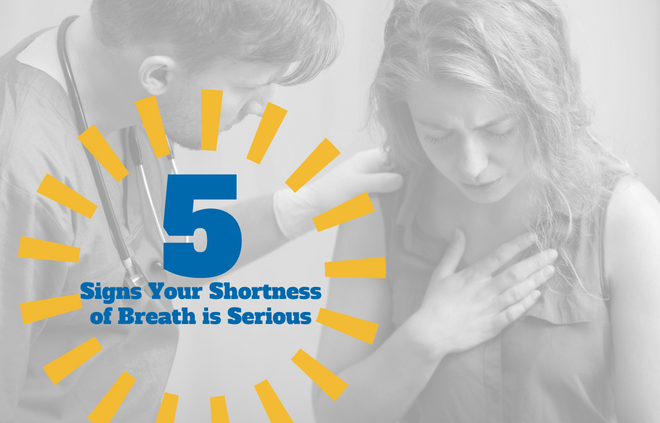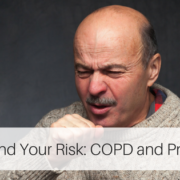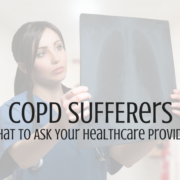Asthma Symptoms: 5 Signs Your Shortness of Breath is Serious
If you suffer from shortness of breath, you’re not alone. It’s a common symptom and one that prompts many people to see a doctor or seek other medical treatment. Knowing when your shortness of breath is an emergency isn’t always easy. It can be the result of hyperventilation, acid reflux, or a panic attack – cases when shortness of breath usually recedes on its own – or more serious issues involving your respiratory health. There are many possible causes of shortness of breath, as well as signs that it’s time to seek medical help.
Shortness of Breath and Its Causes
There’s no clear definition of shortness of breath, but most people describe it as a feeling of being unable to get enough air, or that breathing takes more effort than usual. Some people may feel chest tightness. Shortness of breath may come on in a matter of minutes, or develop chronically over much longer lengths of time.
In the vast majority of cases, shortness of breath is because of conditions related to the heart and lungs. Some of the more common causes include:
- COPD (Chronic Obstructive Pulmonary Disease)
- Asthma
- Serious heart conditions, such as heart attacks or congestive heart failure
- Pulmonary embolism (a blood clot that travels from another part of the body to the lungs)
- Obesity
- Lung disease
- Bronchitis or pneumonia
- A collapsed lung
- If shortness of breath is chronic – meaning it has lasted for weeks or longer – it’s often due to any of the above causes.
Signs That You Should Call A Doctor
Your respiratory health is too important to ignore shortness of breath symptoms, but some signs should never be ignored:
- Swelling in your feet and ankles
- Trouble breathing when you lie flat
- High fever, chills and cough
- Wheezing
- When your pre-existing shortness of breath worsens
COPD
COPD is a chronic lung disease that, as mentioned, is one of the most serious causes of shortness of breath. It’s considered a progressive disease in that its symptoms may be mild at first but become more severe over time. The symptoms of COPD may vary and include:
- Chronic cough
- Coughing up mucus
- Labored breathing during both exercise and resting
- Wheezing
- Frequent colds or flu
- Fatigue
- Frequent morning headaches
- Weight loss
People who suffer from COPD are also likely to have episodes known as exacerbations in which their symptoms suddenly become worse and persist for several days.
Asthma
Asthma is caused by inflammation of the bronchial tubes. This inflammation also results in the production of sticky secretions inside the tubes. When it comes to your respiratory health, asthma – like COPD – should never be taken lightly. Its symptoms are very similar to those associated with COPD: coughing, wheezing, chest tightness and, of course, shortness of breath.
As with COPD, asthma sufferers may go extended periods without experiencing any symptoms before having periods of systems (or asthma attacks). Others may only experience asthma during exercise, or when suffering from viral infections such as colds.
Evaluating Shortness of Breath
Depending on your symptoms, your doctor may evaluate your shortness of breath by using pulse oximetry to estimate the amount of oxygen in your blood, an EKG, a chest x-ray, blood work, or pulmonary function tests.
It’s important to note that while you may suffer from COPD or asthma, your symptoms can still be managed – and allow you to lead a normal life – with the right health care team working with you.







Leave a Reply
Want to join the discussion?Feel free to contribute!